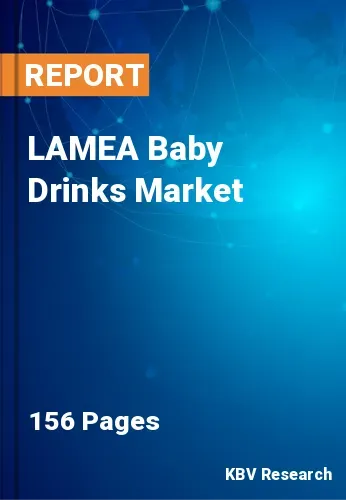The Latin America, Middle East and Africa Baby Drinks Market would witness market growth of 9.7% CAGR during the forecast period (2023-2030). In the year 2026, the LAMEA market's volume is expected to surge to 158.0 Kilo Tonnes, showcasing a growth of 11.6% (2023-2030).
Integrating probiotics and other functional ingredients is emerging as a key innovation in baby drinks. Recognizing the importance of gut health in early childhood development, manufacturers are incorporating probiotics to support digestive health. Functional ingredients, such as antioxidants or omega-3 fatty acids, are also introduced for added health benefits. In the era of digital connectivity, technological integration in marketing plays a crucial role. Brands leverage social media, online platforms, and augmented reality to connect with parents, provide educational content, and create immersive brand experiences.
A commitment to sustainable practices in production shapes the future of the market. From responsibly sourced ingredients to eco-friendly packaging, manufacturers increasingly focus on minimizing environmental impact. This sustainability-driven innovation aligns with the values of environmentally conscious consumers and positions brands as responsible stewards in the market. Brands can engage with consumers by educating them about the environmental impact of their choices and providing information on how the brand is contributing to sustainability.
The LAMEA region has been characterized by population growth, and rising childbirth numbers contribute to an expanding consumer base for baby products, including these. As more infants are born, there is an inherent increase in the potential demand for products catering to the nutritional needs of this demographic. According to the report titled Births and Deaths in the State of Qatar, released by the Government of Qatar, the number of live births in Qatar reached 29,014 in 2020. Thus, with the growing number of childbirths in countries like Qatar and South Africa, there will be an increased demand in the LAMEA region.
The Brazil market dominated the LAMEA Baby Drinks Market, by Country in 2022, and would continue to be a dominant market till 2030; thereby, achieving a market value of $1,728.3 Million by 2030. The Argentina market is showcasing a CAGR of 10.3% during (2023 - 2030). Additionally, The UAE market would register a CAGR of 9.4% during (2023 - 2030).
Based on Application, the market is segmented into 12 Months to 36 Months, 6 Months to 12 Months, Less than 6 Months, and Others. Based on Distribution Channel, the market is segmented into Supermarkets & Hypermarkets, Pharmacies, Convenience Stores, Online Channel, and Others. Based on Product Type, the market is segmented into Infant Formula, Baby Juice, and Baby Electrolyte. Based on countries, the market is segmented into Brazil, Argentina, UAE, Saudi Arabia, South Africa, Nigeria, and Rest of LAMEA.
Free Valuable Insights: The Worldwide Baby Drinks Market is Projected to reach USD 76.2 Billion by 2030, at a CAGR of 9.2%
The market research report covers the analysis of key stake holders of the market. Key companies profiled in the report include Reckitt Benckiser Group PLC, Danone S.A., HiPP GmbH & Co. Vertrieb KG, Nestle S.A, The Hain Celestial Group, Inc., Campbell Soup Company, Abbott Laboratories, Arla Foods, Inc., Bobbie Baby, Inc., and Holle baby food AG.
By Application (Volume, Kilo Tonnes, USD Billion, 2019-2030)
By Distribution Channel (Volume, Kilo Tonnes, USD Billion, 2019-2030)
By Product Type (Volume, Kilo Tonnes, USD Billion, 2019-2030)
By Country (Volume, Kilo Tonnes, USD Billion, 2019-2030)

Our team of dedicated experts can provide you with attractive expansion opportunities for your business.

